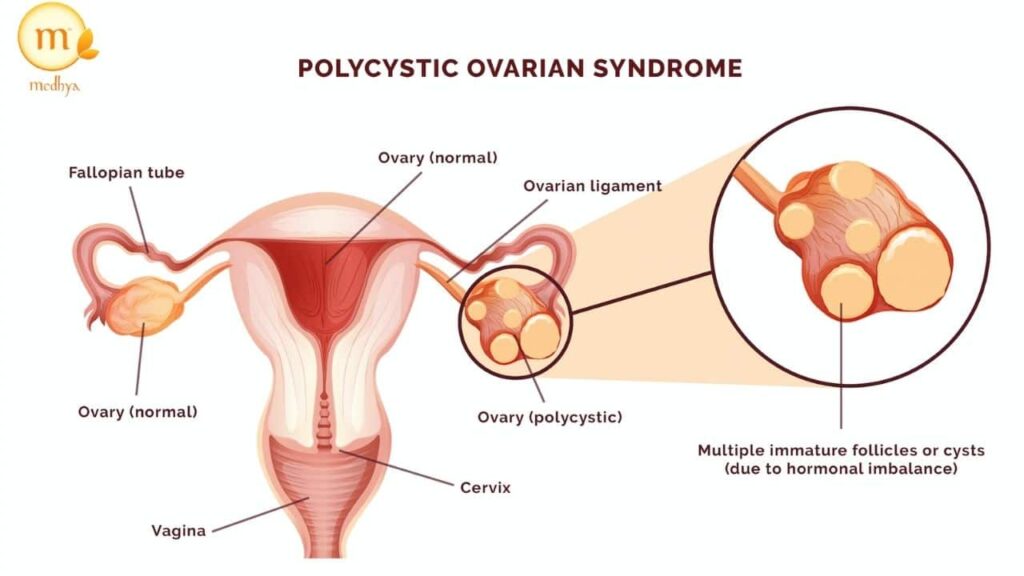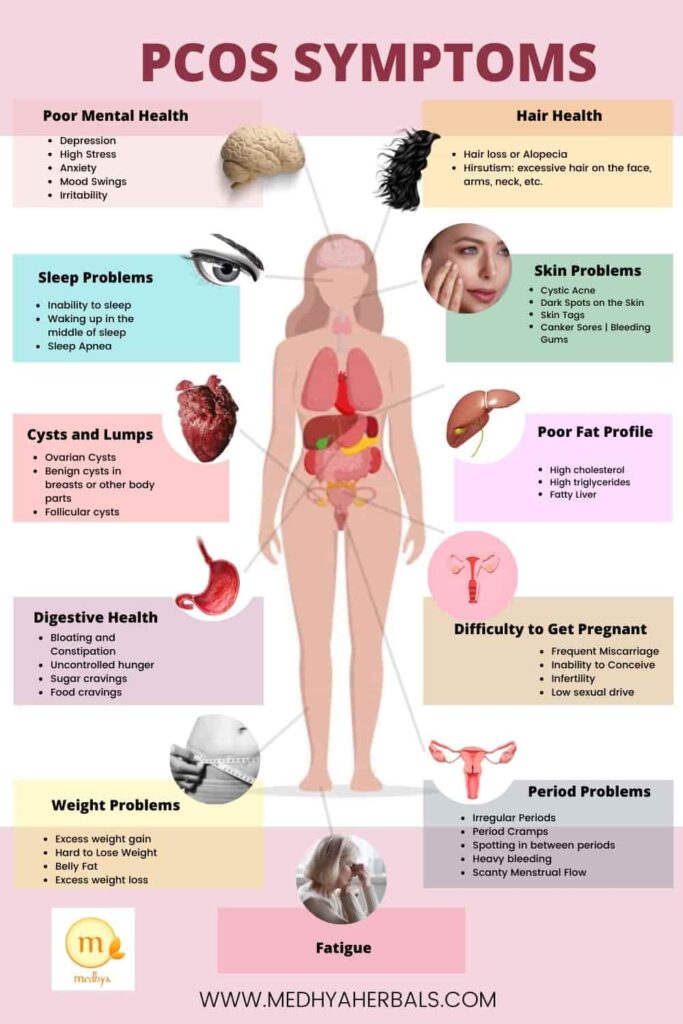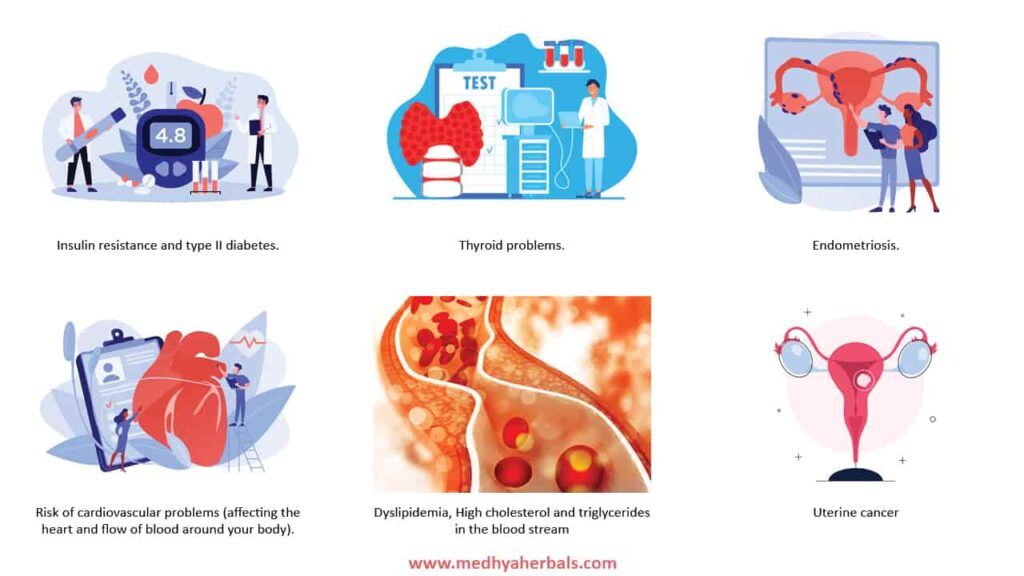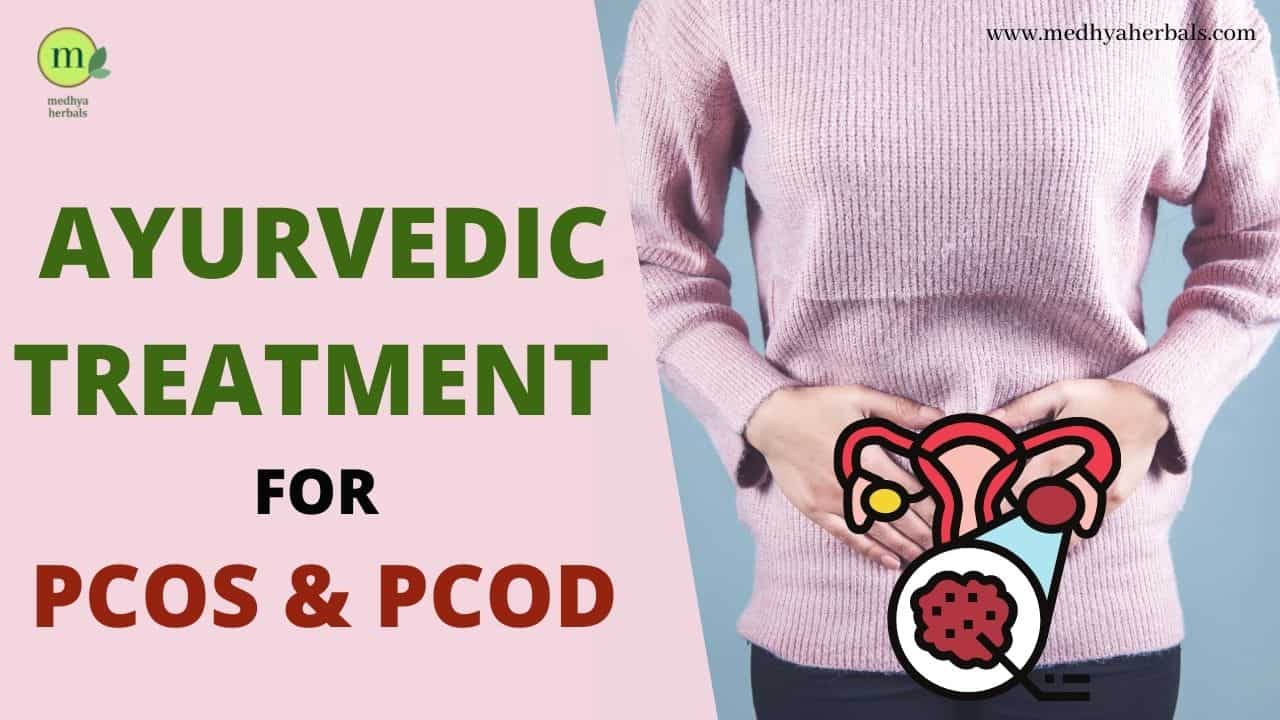Polycystic ovary syndrome (PCOS) is an endocrine disorder among women of reproductive age. It is characterized by hormonal imbalance, which can lead to menstrual irregularity, infertility, weight gain, and other health problems. While there is no one-size-fits-all Ayurvedic treatment for PCOS, there are several Ayurvedic remedies that can help to permanently cure the condition, boost fertility, and help with weight loss.
In this blog post, we will discuss the Ayurvedic treatment for PCOS and how it can help you to permanently find relief from PCOS.
Polycystic Ovary Syndrome (PCOS)
PCOS (Polycystic Ovarian Syndrome) is one of the most prominent reproductive disorders that results from hormonal imbalances.
Polycystic Ovary Syndrome leads to weight gain, menstrual irregularity (infrequent or prolonged menstrual periods) and infertility in a number of pcos patient. The ovaries may develop numerous small collections of fluid (follicles) and fail to regularly release eggs.
PCOS affects about 20% of women of reproductive age, mostly between ages 18-44.

PCOS Symptoms
The symptoms of PCOS vary from woman to woman. Some women with PCOS may have few or no symptoms while others may experience several symptoms. The most common PCOS symptoms include:
1. Difficulty in Conceiving & Infertility
PCOS patients often experience infrequent or irregular ovulation.
This occurs when the ovaries do not release eggs regularly or when the eggs are not released in sufficient quantities. Eggs that are not released or are not healthy cannot be fertilized by sperm, resulting in infertility.
However, do note that not all PCOS patients experience fertility problems.
2. Luteal phase defect (LPD)
It occurs when the corpus luteum, which is responsible for producing progesterone, does not function properly. Progesterone is essential for preparing the endometrium for implantation of the embryo. LPD can also lead to infertility.
3. Obesity, Weight Gain, Difficulty in Losing Weight
Weight gain is a common symptom of PCOS, and it can worsen the condition’s symptoms and health risks. Weight gain in PCOS can be caused by insulin resistance, which increases the amount of glucose in the blood and promotes the storage of fat in the body.
Obesity is also a risk factor for other health problems associated with PCOS, such as type II diabetes and heart disease.

4. Hirsutism or Male Pattern Body Hair Growth
Excess body hair growth (hirsutism) and acne are common symptoms of PCOS. Androgens are male hormone that are present in both men and women. In women with PCOS, there is an imbalance of androgens, which can lead to excess hair growth on the face, chest, back, or buttocks.
5. Acne
Acne is another common symptom of PCOS. This occurs when the pores of the skin become blocked by sebum (an oily substance produced by the sebaceous glands), bacteria, or dead skin cells. The resulting inflammation can lead to pimples or cysts.
6. Irregular Menstruation
PCOS is a condition that affects a woman’s menstrual cycles, thus causing irregular periods. Periods may also be painful or heavy in women with PCOS.
This can be due to the build-up of uterine lining during periods of anovulation (lack of ovulation). The resulting inflammation can lead to pain and cramping.
Other symptoms of PCOS are:
- Ovarian Cyst: Cysts appear on ovaries
- Male pattern baldness
- Hair loss and hair thinning
- Mood swings, irritability, and depression, also surface due to hormonal problems
- Darkening of the skin at the neck, underarms and in different skin folds
- Headaches
What causes Polycystic Ovarian Syndrome?
There are a variety of factors that can contribute to the development of PCOS, including hormonal imbalance, genetics, insulin resistance, inflammation, and psychological stress.
Hormonal imbalance is one of the most common causes of PCOS. This can be due to excess androgen (male hormone) in the body or an insulin resistance that prevents the body from properly using the hormone insulin.
Genetics also plays a role in the development of PCOS. If you have a family member with PCOS, you may be more likely to develop the condition yourself.
Insulin resistanceis another common cause of Polycystic ovarian syndroe. This occurs when the body’s cells don’t respond properly to the hormone insulin, which can lead to an increase in androgen levels.
Inflammation is also thought to play a role in the development of PCOS. This may be due to chronic inflammation of the ovaries or the lining of the uterus (endometrium).
Psychological stress can also contribute to PCOS. This may be due to the body’s response to stress hormones, such as cortisol.
Ayurvedic Treatment for PCOS
Ayurvedic treatment for PCOS can help to regulate female hormone and improve fertility. Ayurveda offers effective natural remedies are provided to identify and treat the root cause of PCOS or PCOD in women.
PCOS (or Artavakshaya) is classified as a Kapha Dosha imbalance. Kapha is the dynamic energy of growth and structure. This points towards the root cause of typical PCOS Symptoms as ovarian cyst, excess body weight, excess vaginal discharge, irregular periods, lethargy, depression, mood swings, and facial hair.
And when other Dosha also get involved, then one may suffer from additional health symptoms.
Depending on whether Pitta or Vata or both got involved, you may experience inflammation, acne, rashes, heat, missed periods, heavy periods, anxiety, and stress.
Ayurveda clearly classifies PCOS according to the Dosha that have gone out of balance. And accordingly, it prescribes Ayurvedic herbs, therapies, yoga and exercise and dietary regime to put your Dosha to balance.
Ayurveda Treatment Regimen for PCOS
If you have been diagnosed with polycystic ovarian syndrome, PCOD or PCOS, then you may want to consider Ayurveda for its 100% Natural & holistic approach to cure PCOS. Here are the primary objectives of Ayurvedic Treatment for PCOS:
- Detoxification of the body. It will help to get rid of the body fat and toxin buildup that causes inflammation and body weight gain.
- Strengthen the reproductive system to maintain the health of Artava Dhatu. This helps to regulate the menstrual cycle and boost fertility.
- Pacify and balance the vitiated doshas. This will help to remove the hormonal imbalance such as excess Adrogens and insulin resistance as experienced in polycystic ovarian syndrome.
- Promote mental wellness. This helps to reduce stress and improves emotional balance.
Ayurvedic Herbs for PCOS Treatment
Ayurveda Treatment regimen for PCOS involves the use of Ayurvedic herbs and Ayurvedic therapies to support Artava Dhatu or fertility in women and restore the female hormone balance to establish the natural rhythm of the menstrual cycle. This can help you to conceive your baby naturally.

Here is a list of Ayurveda medicines that will help you with it.
1. Amla
Amla is useful for its detoxifying qualities. It also works well to reduce cholesterol levels.
That is not all. It is an anti-inflammatory agent, so it removes free radicals and helps to restore hormonal balance in the body.
2. Red Clover
This is another herb used in Ayurvedic treatment for polycystic ovarian syndrome. It is useful because it is a rich source of phytoestrogens (estrogen rich foods from plants).
Thus, it acts as a natural source of estrogens without taking pills. Red clover also helps in purifying the blood and curing acne.
3. Tulsi
Holy basil or tulsi helps to relieve hyper androgenism (excess male hormone) that comes with PCOS symptoms. Thus, it helps to control hirsutism (unwanted hair growth) and anovulation.
Tulsi also improves insulin sensitivity and reduces high insulin levels. Hence, it removes one of the root cause of high andogens.
Take 2-3 leaves of tulsi early in the morning on an empty stomach. You can also boil it in water and drink it regularly.
4. Licorice
Licorice is a sweet tasting root that helps to balance hormones and establish the harmony of female reproductive system. Specifically, it helps to reduce high Estrogen and high male hormones. This reduces the growth and spread of unwanted body hair in PCOS.
5. Fennel Seeds
These help decrease excess androgen (male hormones), and thus can help deal with excess body hair or hirsutism and acne problems in PCOS.
6. Ashoka
Ashoka bark acts as a tonic for uterus. It promotes ovulation, treats hormonal imbalance and significantly reduces high Androgen levels. Thus, it is highly effective against facial hair and acne.
7. Cinnamon
Insulin resistance is the situation in which your body cells resist the action of insulin (sugar regulator). The consequence is that you have too much sugar in your bloodstream.
Cinnamon resolves insulin resistance. This has been proven by research in which 15 pcos patient were given cinnamon for eight weeks. At the end, their menstrual cycles irregularity and insulin resistance had significantly reduced.
8. Gymnema
This is a traditional Ayurvedic herb that can also be employed in treating polycystic ovarian syndrome. It has anti-diabetic, hypoglycemic, lipid-lowering, and weight loss actions.
That’s a lot of things packaged into just one herb. Yet there’s more. It also regulates insulin levels and deals with insulin resistance.
9. Shatapushpa
This is a highly effective Ayurvedic medicine that can help to reduce ovarian volume. It also helps to grow eggs naturally and helps to split follicles naturally.
This promotes regular ovulation, reduces follicles on the ovaries and boosts fertility.
10. Pumpkin Seeds
They contain healthy omega-3 fatty acids. What do those do? They help manage cholesterol and insulin levels. They also treat weight gain, hirsutism, and acne by dealing with male hormones.
11. Triphala
Triphala is a powerful Ayurvedic Rasayana (Herbal elixir known to promote longevity and rejuvenation).
It deeply cleanses our body and helps to flush out wastes and toxins. Triphala has powerful antioxidants to rejuvenate, inhibit inflammation, promote healthy build of body cells, and blood purification.
12. Aloe vera
Aloe vera has a toning effect on reproductive system. It is an emmanagogue, meaning it helps to establish regular menstrual flow. Also, aloe vera supports detoxification. It significantly reduces inflammation and pain in the body.
Regular consumption of aloe vera will help you to reduce the pain, support ovulation and establish regular menstrual cycles.
13. Shatavari
Shatavari nourishes the reproductive tissues and improves the fertility health in a woman. It enhances follicle production and ovulation and prepares uterus for conception.
Regular use of Shatavari prevents miscarriages. Thus it is helpful in cases of sub fertility and infertility.
It helps in balancing the pH level of the vagina which improves the chances of pregnancy by providing a fertile environment for sperm.
14. Ashwagandha
Ashwagandha is a powerful adaptogen and a revered Ayurvedic elixir for rejuvenation, nourishment, and strength. It is a natural supplement to lower cortisol and balance thyroid hormones. Ashwagandha literally translates to the “strength of the stallion”.
An aphrodisiac, it supports female reproductive system and fertility in women by strengthening the uterus.
15. Lodhra
Lodhra is highly effective in reducing uterine disorders. It helps to reduce male hormones, establishes regular ovulation, strengthens female reproductive system and improves fertility.
Lodhra is rich in antioxidants that reduce inflammation and hormonal imbalance, which cause PCOS Symptoms.
16. Black Sesame Seeds
Black Sesame seeds act as a tonic for the reproductive tissues. They establish regular ovulation and also regulate menstrual flow. Black sesame seeds also prevent weakness and strengthen the body as a whole.
17. Turmeric
Turmeric has anti-inflammatory properties. It helps to balance both Vata dosha and kapha dosha. Regular consumption of turmeric promotes regular ovulation and prevents irregular periods.
However, caution should be taken if you are suffering from excessive bleeding. Turmeric may make it worse.
Ayurvedic Diet Tips for PCOS Treatment
Ayurveda recommends eating a diet that is rich in fruits, vegetables, whole grains, and healthy fats. Ayurvedic diet can help to regulate blood sugar levels and reduce inflammation.
- Eat healthy meals regularly and at the right times.
- Reduce your consumption of red meat and deep-fried foods.
- Reduce your intake of dairy, except curd or buttermilk.
- Avoid sugar and artificial sweeteners. You can go for honey in moderation as a natural sweetener.
- Eat meals that will pacify the vitiated doshas.
- Take a lot of fruits and vegetables, and a lot of high-fiber foods too.
- Favor ghee, nuts like almonds, walnuts, pecans, flax seeds, sunflower seeds and pumpkin seeds, buttermilk, avocado, beets, lentils.
Exercise & Yoga Asana for Ayurveda Treatment of PCOS
Regular exercise can help to lower insulin levels, reduce inflammation, and promote weight loss.
Don’t just exercise for the sake of it. Make sure you’re doing it right as shown here in the Guide to PCOS exercise.
Now, talking about Yoga Asana. What makes yoga effective as a natural cure for PCOS?
Well, Yoga is a form of exercise that doesn’t just deal with you moving your body. It also actively engages your mind at the same time. So, you’re gaining on two sides.
So, what Yoga asana does Ayurveda recommend for addressing PCOS? Here are just a few:
Yoga Asana for PCOS Treatment

- Bharadvaja’s Twist (Bharadvajasana): This aids the functioning of the cardiovascular system, deal with menstrual problems, and relaxes your spine and muscles.
- Butterfly pose: It helps to relieve menstrual pains and take care of inflammation in the pelvic region.
- Reclining butterfly pose (Suptabadhakonasana): It exercises the pelvic area and abdominal muscles.
- Corpse pose (Shavasana).
- Padma Sadhana.
- Moving the grinding wheel (Chakki Chalanasana): It normalizes the functioning of the pelvic and reproductive organs, aids weight loss at the stomach and hips, and also helps ovulation.
- Sun salutation
- Bow pose (Dhanurasana): It stimulates the proper functioning of the reproductive organs and relieves menstrual pain. Also, it strengthens your liver and pancreas to better deal with the diabetic symptoms that PCOS poses.
- Cobra pose (Bhujangasana): By stretching the lower abdomen, it stimulates ovary function. Also, it helps digestion and reduces stress.
- Boat pose (Naukasana): This is great for burning that belly fat. The pressure you put on the abdominal region while doing this pose helps to increase blood flow to the ovaries and other reproductive organs.
Panchkarma (Detoxification) Therapies for PCOS Treatment
Apart from Ayurvedic medicine, a healthy diet and lifestyle changes, PCOS patients may also benefit from Ayurvedic therapies. These Ayurvedic treatment options are employed on case by case basis.
Depending on the dosha that have gone out of balance, your doctor may recommend any of the following Ayurvedic therapies:

1. Panchakarma
Panchakarma means five works of deep purification that boost fertility, immunity and ojas “vitality”. It involves cleansing and healing of the body as a whole.
All the five procedures are employed in a sequence to systematically release and flush the toxins out, establish the digestive fire, and then to strengthen the weakened body systems.
Panchakarma should be done under the supervision of an Ayurvedic Doctor to get maximum benefits and also to prevent any damage (due to lack of knowledge).
Therapies given below are part of the Panchakarma. They can be employed stand alone or in the sequence as charted out by your Doctor.
2. Uttar Basti (Herbal Enema)
Basti refers to enema and uttar basti refers to enema of the uterus. Herbal oils and concoctions are used to perform uttar basti.
It helps to regulate the apana vata (responsible for working of reproductive system) and facilitates regular ovulation.
Uttar Basti helps to strengthen the uterus and boosts fertility by supporting successful implantation of the fertilized egg.
3. Virechana (Cleansing)
It refers to the cleansing procedures that support the health of the liver and help to flush out toxins. Virechana is primarily targeted to regulate the Pitta Dosha in PCOS patients.
It helps to establish regular bowel movement and promotes digestive fire for better metabolism.
4. Vamana (Vomiting)
Vamana helps to remove excess Kapha from the upper digestive tract through induced vomiting. Herbal concoctions and medicated oils are used to systematically release the toxins that can be flushed out via Vamana.
It is really helpful in establishing female hormone balance and removing the blockade in body channels. Thus, Vamana helps to bring good flow of hormones and induces regular ovulation.
5. Nasya (Oil in Nostrils)
It promotes regular flow of hormones by establishing Vata dosha balance.
Nasya involves regular insertion of medicated oil or ghee in both nostrils. It promotes flow of prana, supports vitality and longevity.
Other than these Ayurvedic therapies, regular “Abhyanga” or body massage with medicated oils is recommended. Another procedure is “Swedna” or induced sweating via heat treatment or physical activity.
Ayurvedic Lifestyle for PCOS Treatment
One of the most important aspects of ayurvedic treatment is making lifestyle changes. These changes can help to regulate hormones and improve fertility. Some of the lifestyle changes that are recommended for PCOS include:
- Stress can worsen the symptoms of PCOS. Therefore, it is important to find ways to reduce stress. Stress-reducing activities such as yoga and meditation can be helpful.
- Reduce your exposure to plastics. They can cause hormonal problems.
- Restrict your use of hormone-based contraceptives. If you can, avoid them completely.
- Stop smoking and completely avoid alcohol.
- Don’t eat junk food. Eat healthily and avoid getting hungry so that you can better resist the temptation to eat junk food.
- Keep a regular, again, regular, sleep pattern in the night. Learn here on Ayurvedic guidelines for good sleep.
- Try not to sleep in the day so you don’t break your sleep cycles.
- Shed weight. Losing 5-10% of body weight has been found to resolve symptoms in cases of PCOS. Here’s a PCOS weight loss plan to get started with.
Consult your doctor
Women diagnosed with PCOS should receive PCOS treatment as soon as possible. Early diagnosis and treatment can help to avoid PCOS health risks and save you from the physical and mental pain of PCOS symptoms.
If you would like to reverse PCOS or seek Ayurvedic treatment for PCOS and PCOD, do contact Medhya Herbals for an online consultation and to chart out your personalised health plan to treat PCOS naturally.
Takeaway!
FAQS on Ayurvedic Treatment for PCOS
Here are a few frequently asked questions on Ayurvedic treatment for PCOS. Look through those.
If you still have more questions though, then just reach out in the comments. We will get back to you as soon as possible.
1. Can I still get pregnant with PCOS?
Polycystic ovary syndrome (PCOS) is a hormonal disorder that can affect women of reproductive age. The main symptoms include irregular periods, excess hair growth, and ovarian cyst. PCOS can make it difficult to become pregnant, but it is not impossible.
Ayurveda offers many natural treatment options that can help you conceive, including Ayurvedic medicines, yoga therapy, diet and lifestyle changes. If you are struggling to get pregnant, consult with your Ayurvedic doctor about your options. With the right pcos treatment, you will be able to increase your chances of becoming pregnant and giving birth to a healthy baby.
2. Why shouldn’t I go with allopathy medicine instead?
In modern medicine, basically two drugs are prescribed as a treatment for PCOS. One is metformin, for insulin resistance.
The other one is a contraceptive, which only seeks to mask the symptoms that you feel. It won’t correct the underlying problem.
Another option is surgery to remove the cysts. This can end up damaging otherwise healthy structures during the procedure.
On the other hand, Ayurveda uses natural methods, such as you’ve seen up there.
3. How long does Ayurveda take to cure PCOS?
Polycystic ovary syndrome (PCOS) is a hormonal disorder that affects women of childbearing age. The cause of PCOS is unknown, but it is thought to be related to insulin resistance and an imbalance of the sex hormones. Symptoms of PCOS include irregular periods, excess hair growth, acne, and weight gain. While there is no cure for PCOS, Ayurveda offers a holistic approach to managing the condition. Ayurvedic treatment for PCOS typically involves a combination of dietary changes, herbal supplements, and lifestyle modifications. The goal of treatment is to restore balance in the body and alleviate symptoms. Depending on the individual’s response to treatment, the duration of treatment can vary from a few months to several years. However, with commitment and dedication, Ayurveda can provide lasting relief from the symptoms of PCOS.
4. There is PCOS in my family. How can I ensure it doesn’t reach me?
PCOS is a condition that can be passed down through families. If you have PCOS in your family, there are steps you can take to ensure that you don’t develop the condition yourself. One of the best things you can do is to maintain a healthy weight. Obesity is one of the main risk factors for PCOS, so keeping your weight in check is essential. You should also avoid processed foods and eat a diet full of whole foods. Exercise is also important, as it can help to regulate hormone levels. Finally, make sure to get regular checkups with your doctor so that any potential problems can be caught early. By taking these steps, you can reduce your risk of developing PCOS.
5: Can I continue my medications along with my Ayurvedic treatment for PCOS?
Well, you should note here that anything you try should be evaluated by your doctor. Do not just go swallowing herbs indiscriminately.
However, you do not need any other medications if you’re following an Ayurvedic treatment for PCOS.
6. What is PCOD?
PCOD (Polycystic Ovarian Disease) is a condition in which the ovaries produce high amounts of androgens (male hormones), particularly testosterone resulting in high levels of luteinizing hormone(LH) and low levels of follicle-stimulating hormone (FSH) prevents follicles from producing a mature egg leading to anovulatory cycles and irregular menstruation.
7. What are the Health Risks due to Polycystic Ovary Syndrome (PCOS)?
PCOS is a progressive health disorder arising in hormonal imbalance. If the hormonal imbalances are not addressed in time, it may lead to health complications and chronic issues of the reproductive system.
This is why you need to get the right diagnosis and start PCOS treatment to address the imbalances as soon as possible.

Here are some of the health complications when PCOS is not treated in time:
- Insulin resistance and type II diabetes
- Thyroid problems
- Dyslipidemia, High cholesterol and high triglycerides in the blood stream
- Risk of cardiovascular problems (affecting the heart and flow of blood around your body)
- Endometrial Cancer
- Uterine cancer
REFERENCES:
- Clinical efficacy of Ayurveda treatment regimen on Subfertility with Poly Cystic Ovarian Syndrome (PCOS)
- Shantaram Gajanan Khanage, Tarkasband Yogita Subhash and Inamdar Rahat Bhaiyyasaheb, Herbal Drugs For The Treatment Of Polycystic Ovary Syndrome (Pcos) And Its Complications, Pharmaceutical Resonance 2019 Vol.2 – Issue 1
- Ashiya Laxmipriyadei, Role of Yoga in Polycystic Ovarian Syndrome: A Healthy Step to Fight with Hormonal Imbalance, Int J Ayu Pharm Chem
- AN EFFORT TO UNDERSTAND PCOS IN AYURVEDA CONTEXT
- Ayurvedic medicine for the management of polycystic ovary syndrome (PCOS)
- Effect of cinnamon supplementation on fasting blood glucose and insulin resistance in patients with type 2 diabetes
All the Ayurvedic herbs and formulations that have been shared in this post are for information purpose only. All of these are potent Ayurvedic medicines that should be taken under the supervision of a qualified Ayurvedic doctor only. Do not indiscriminately use Ayurvedic herbs as it may cause more harm than benefit.


Hi I want pcod diet plan
Hi! You will find PCOS Diet Plan in here: https://medhyaherbals.com/pcos-diet/